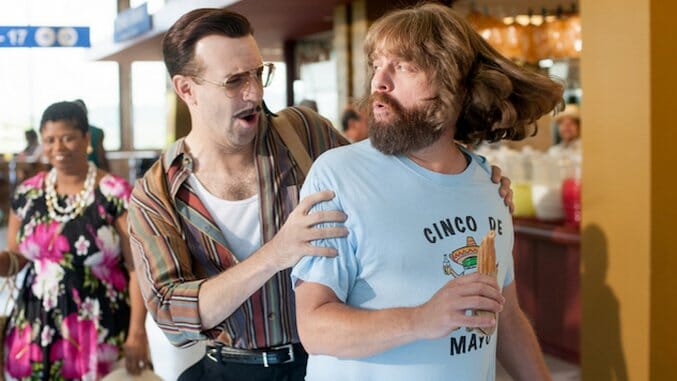Masterminds—a heist comedy based on the 1997 Loomis Fargo robbery in North Carolina, the second-largest cash robbery in U.S. history—is, for the most part, an intolerable slog, stuffed with broader-than-broad hick caricatures and lowest-common-denominator toilet humor in place of anything resembling genuine wit. But if you dare look at it from an auteurist perspective—that auteur being Jared Hess, who, despite his best efforts, will perhaps always be known for bringing Napoleon Dynamite into the world—the film develops a kind of terrible fascination.
This time around, Hess didn’t write the screenplay for Masterminds; the script is credited to Chris Bowman, Hubbel Palmer and Emily Spivey. And outside of one scene in which main character David Ghantt’s (Zach Galifianakis) fiancée, Jandice (Kate McKinnon), explains how they met, it has barely any of the religious concerns that have marked some of his work (Nacho Libre, Gentlemen Broncos, Don Verdean) since his 2004 debut. Nevertheless, the sensibility on display—chiefly, a fascination with naive outsiders that toes the line between empathy and derision—feels fundamentally his.
One can sense this immediately in David’s opening voiceover narration—the Southern accent a mile wide, the “aw shucks” manner heavily reminiscent of that of Napoleon Dynamite, Nacho Libre and previous Hess creations. Not that there’s any particular reason Hess offers that David acts in such a ridiculously oblivious and childish way, any more than there was any reason, say, Napoleon Dynamite had a pet llama. Apparently, these are the kinds of quirks Hess finds infinitely hilarious. It’s that emphasis on whimsical eccentricity above all else that constitutes the Hess touch, without any of the profundity that occasionally leaks through the ultra precious frames of other committed eccentrics like Wes Anderson. Even though Hess didn’t originate the character of David Ghantt, he turns out to be arguably his most irritating lead character yet.
Not every character in Masterminds is pitched at the same exaggerated level. In comparison to Ghantt, two of his robbery cohorts, Kelly Campbell (Kristen Wiig) and her friend Steve Chambers (Owen Wilson), are played as relatively normal people, straight men to David’s man-boy insanity. The only supporting character to come close to matching its leading man in ridiculousness is Michael McKinney (Jason Sudeikis), a hitman Steve has hired to knock off David, but who turns out to be a perverse kindred spirit to his target. The logic with which this dynamic develops throughout the film suggests that Hess isn’t throwing behavioral peculiarities at a wall and seeing what sticks: He knows exactly what he’s doing, and modulating the comedy accordingly.
Ultimately, though, David commands the center of attention in Masterminds, and how could he not, with Hess encouraging Galifianakis to not only shoot for over-the-top in his mugging, but reach for realms even beyond that. Kelly supposedly develops a fondness for David as the events unfold, but David is rendered as such a grotesque from frame one that it’s unimaginable how anyone could find him useful in a heist, much less as a love interest. Perhaps that’s Hess’ personal stamp in this for-hire assignment: turning what was perhaps a halfway plausible oddball on the page into one huge ironic joke, and having everyone around him react cluelessly to his idiocy. Twelve years after Napoleon Dynamite, it appears Hess is still inviting us to feel superior to his galleries of freaks, and it remains as sorely unedifying as it always was.
Director: Jared Hess
Writers: Chris Bowman, Hubbel Palmer, Emily Spivey
Starring: Zach Galifianakis, Kristen Wiig, Owen Wilson, Kate McKinnon, Leslie Jones, Jason Sudeikis
Release Date: Sept. 30, 2016
Kenji Fujishima is a freelance film critic, contributing to Slant Magazine, Brooklyn Magazine, The Playlist, and the Village Voice in addition to Paste. He is also Deputy Editor of Movie Mezzanine and former editor-in-chief of In Review Online. When he’s not watching movies and writing and editing film criticism, he’s trying to absorb as much music, art and literature as possible. He has not infrequently been called a “culture vulture” for that reason.
